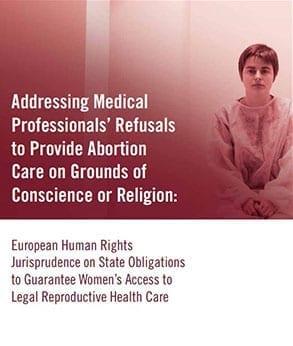Ireland President Michael D. Higgins Signs Protection of Life During Pregnancy Bill 2013 Into Law
Legislation Only For Women Whose Live Are At Risk Fails to Expand Access to Safe and Legal Abortion
(PRESS RELEASE) Today Ireland’s President Michael Higgins signed the Protection of Life During Pregnancy Bill 2013 into law. The abortion legislation is designed to provide doctors and individuals clarity about the circumstances under which a woman whose life is at risk may legally end a pregnancy.
While the Center for Reproductive Rights appreciates that Irish legislation now clarifies the circumstances under which abortion is legal in Ireland, the country needs to do more in order to fulfill women’s fundamental human rights to health and reproductive autonomy.
Said Johanna Westeson, regional director for Europe at the Center for Reproductive Rights:
“President Higgins, Prime Minister Enda Kelly and the Irish Parliament have taken a critical step in finally adopting abortion legislation, but it only helps a small number of women.
“Even with Ireland’s abortion law in place, women’s rights will still be violated. Women pregnant due to rape or incest, or who are carrying fetuses with severe impairments, among many other women who have reasons besides a threat to their lives, won’t be allowed to exercise their reproductive human rights.
“Irish women who have the means to travel for a legal abortion will and the women who cannot—poor, young, or otherwise marginalized—are forced to give birth, creating a two-class system where women without resources are also without choice.
“Essential reproductive health care is a fundamental human right, which Ireland is obliged to fulfill. We hope this law now paves the way for the Irish government to bring forth future legislation that will expand women’s access to safe and legal abortion and the full range of essential reproductive health care.”
On paper, abortion has been legal in Ireland in exceptional circumstances since 1992 for women whose pregnancies place their lives at risk, including women who are at risk for suicide. But an absence of regulations on the procedure has made abortion virtually impossible to access even under these narrow circumstances. This has led women to seek abortions outside of the country or—for women who are unable to travel abroad-to continue with their pregnancies, putting their health and lives at risk. The Protection of Life During Pregnancy Bill 2013 clarifies the conditions for legal abortion, as called for by the European Court of Human Rights in a 2010 judgment. The Dáil (House of Representatives) passed the bill on July 11. A draft of the bill was published on June 12 and an outline of the bill was published on April 30.
The exceptionally restrictive Irish abortion regime goes against well-established human rights standards and has been criticized by several international human rights bodies. In the 2010 European Court of Human Rights case, A, B and C v. Ireland, the Center for Reproductive Rights argued that Ireland’s current abortion law is inconsistent with legal standards for abortion regulations in international human rights law, and in comparison to other countries in Europe. The court ruled that Ireland violated the human rights of a woman with cancer by failing to provide her a procedure through which she could determine whether she qualified for a legal abortion in the country.

